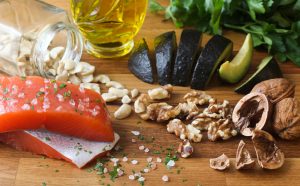 An essential part of a heart healthy diet is plenty of plant-based unsaturated fats. Not only do plant-based foods provide heart-healthy fiber, but they are also rich in antioxidants. These antioxidants can help reduce inflammation in the body, and in turn reduce chronic disease risk. One such group of antioxidants are the omega-3 fatty acids found in such foods as avocado, plant-based oils and fatty fish. Recent research shows that these healthy fats may be able to help with mental health. A recent study shows that by increasing the amount of healthy fats in your diet, you could help reduce symptoms of anxiety.
An essential part of a heart healthy diet is plenty of plant-based unsaturated fats. Not only do plant-based foods provide heart-healthy fiber, but they are also rich in antioxidants. These antioxidants can help reduce inflammation in the body, and in turn reduce chronic disease risk. One such group of antioxidants are the omega-3 fatty acids found in such foods as avocado, plant-based oils and fatty fish. Recent research shows that these healthy fats may be able to help with mental health. A recent study shows that by increasing the amount of healthy fats in your diet, you could help reduce symptoms of anxiety.
What are healthy fats?
Healthy fats typically describe the group of fats known as unsaturated fats. These fats can be found in plant-based foods such as avocado, nuts, and seeds. They can also be found in plant-based oils like olive oil and fatty fish like salmon and trout. Research shows that by replacing some of your saturated fat intake with unsaturated fats, you can benefit heart health. The cause of this is still unknown, but it is suggested that it may be due to the fiber and antioxidants in such unsaturated food sources.
Healthy fat intake and anxiety
A recent meta-analysis study looked at research done on omega-3 fatty acid supplementation and mental health. Study results show that those with clinically diagnosed anxiety may benefit from treatment with omega-3 fatty acids. This is because treatment with such fats seemed to reduce symptoms of anxiety under stressful situations. Even those who suffered from other diagnosed mental health conditions outside of clinical anxiety showed reduced anxiety symptoms after such treatment.
Although more research needs to be done to confirm such findings, these results are promising for future potential treatment options for anxiety. In the meantime, it can’t hurt to add in more healthy fats to your daily diet. Also, an omega-3 fatty acid supplement could be helpful to healthy of the body and mind. An example of such a supplement is fish oil like that by Vita Sciences. This formula by Vita Sciences provides 400 milligrams of EPA and 300 milligrams of DHA, which are omega-3 fatty acids found in cold water fish. This supplement is a great way to get your healthy fats if you don’t think you will be able to get them in every day in your diet.
Other ways to help reduce anxiety
Besides increasing healthy fats in your diet, there are other ways you can work to reduce anxiety in your daily routine.
- Make sure to sleep enough each day: The average adult should receive at least 7 to 9 hours of sleep every night. Sleep is important not just for energy levels, but for regulating fluid, hormones, and blood pressure in the body. Lack of sleep can also increase risk of anxiety and stress levels, especially in those that already suffer from anxiety. If you have trouble sleeping, visit the National Sleep Foundation website for tips. You should also visit your healthcare provider if you find that your sleep problems become a long-term problem. This is because you may be suffering from a condition known as sleep apnea that can affect quality of sleep and breathing. A healthcare provider can also help you manage pain, urinary incontinence, or insomnia that can impact sleep quality and quantity.
- Talk to someone: Talking to a health care professional like a therapist or counselor can help you come up with strategies for dealing with your stress or anxiety. Even just talking to a friend or loved one may be helpful to get worries off your mind.
- Find time to relax: Try to set aside at least 15 minutes a day to relax. This relaxing could include relaxation breathing, diffusing calming essential oils like lavender, or engaging in activities like yoga or meditation.
- Volunteer in your community: Helping others in your community may be able to increase your sense of purpose and help you meet others with similar interests. In turn, these factors may help lower your stress and anxiety levels over time.
- Stay active: Regular exercise each day can help reduce anxiety levels. This may be due to the vitamin D you get from working out in the sunshine. Also, it could be from the serotonin your body releases when you exercise. Either way, get moving each day and it can make you feel better inside and out.
-written by Staci Gulbin, MS, MEd, RD
References:
Harvard Health Publishing: Harvard Medical School (August 13, 2018) “The truth about fats: the good, the bad, and the in-between.” https://www.health.harvard.edu/staying-healthy/the-truth-about-fats-bad-and-good
Lattari, E., Budde, H., Paes, F., Neto, G. A. M., Appolinario, J. C., Nardi, A. E., … Machado, S. (2018). Effects of Aerobic Exercise on Anxiety Symptoms and Cortical Activity in Patients with Panic Disorder: A Pilot Study. Clinical Practice and Epidemiology in Mental Health : CP & EMH, 14, 11–25. http://doi.org/10.2174/1745017901814010011
National Sleep Foundation (accessed September 18, 2018) “How Much Sleep Do We Really Need?” https://www.sleepfoundation.org/how-sleep-works/how-much-sleep-do-we-really-need
Nauert, PhD, R. (accessed September 18, 2018) “Sleep Loss Increases Anxiety-Especially Among Worriers.” https://psychcentral.com/news/2013/06/27/sleep-loss-increases-anxiety-especially-among-worriers/56531.html
Su K, Tseng P, Lin P, et al. Association of Use of Omega-3 Polyunsaturated Fatty Acids With Changes in Severity of Anxiety SymptomsA Systematic Review and Meta-analysis. JAMA Network Open.2018;1(5):e182327. doi:10.1001/jamanetworkopen.2018.2327
 The Greek-style diet has long been touted as one that is full of heart healthy benefits. These benefits are thought to stem from the vast array of healthy fats from plant-based sources and limiting of saturated fats from red meats as well as the rich source of fruits and vegetables in this Mediterranean regimen. However, the health benefits may extend much further than initially realized. A recent study shows that the Mediterranean diet may help to lengthen life of older adults.
The Greek-style diet has long been touted as one that is full of heart healthy benefits. These benefits are thought to stem from the vast array of healthy fats from plant-based sources and limiting of saturated fats from red meats as well as the rich source of fruits and vegetables in this Mediterranean regimen. However, the health benefits may extend much further than initially realized. A recent study shows that the Mediterranean diet may help to lengthen life of older adults. Any kind of movement is good for health. Studies have shown time and again that sitting is bad for health. But, is one kind of exercise better than the other when it comes to weight loss? This is a controversial topic since some studies show that strength training can keep calories burning long after your workout. However, a recent study has shown that cardio exercise may actually be better than strength training in boosting metabolism.
Any kind of movement is good for health. Studies have shown time and again that sitting is bad for health. But, is one kind of exercise better than the other when it comes to weight loss? This is a controversial topic since some studies show that strength training can keep calories burning long after your workout. However, a recent study has shown that cardio exercise may actually be better than strength training in boosting metabolism. About alcohol
About alcohol Could it be? Could the delicious sweetness of chocolate actually be good for you? The answer is yes, but in moderation. Chock full of antioxidants, this delicious treat may be able to help you combat heart disease. A recent study has shown that moderate consumption of chocolate can reduce risk of heart disease.
Could it be? Could the delicious sweetness of chocolate actually be good for you? The answer is yes, but in moderation. Chock full of antioxidants, this delicious treat may be able to help you combat heart disease. A recent study has shown that moderate consumption of chocolate can reduce risk of heart disease. Now you may be saying to yourself, “Another article telling me to eat vegetables.” :sigh: However, this is not just another one of “those” articles. There are more reasons to eat your veggies than you may think. Besides providing digestive-friendly fiber and antioxidants, a recent study has shown that eating a more plant-based diet can actually lower your heart and diabetes health numbers.
Now you may be saying to yourself, “Another article telling me to eat vegetables.” :sigh: However, this is not just another one of “those” articles. There are more reasons to eat your veggies than you may think. Besides providing digestive-friendly fiber and antioxidants, a recent study has shown that eating a more plant-based diet can actually lower your heart and diabetes health numbers. Probiotics have become the talk of the town, and for good reason. Every day more research shows that taking probiotics can reduce inflammation in the gut, and in turn, may help reduce risk of inflammatory conditions such as heart disease, eczema, and inflammatory bowel disease. Therefore, adding a probiotic to your daily routine may be the answer to help free your gut, and in turn your body, from inflammation.
Probiotics have become the talk of the town, and for good reason. Every day more research shows that taking probiotics can reduce inflammation in the gut, and in turn, may help reduce risk of inflammatory conditions such as heart disease, eczema, and inflammatory bowel disease. Therefore, adding a probiotic to your daily routine may be the answer to help free your gut, and in turn your body, from inflammation. Whether you walk, run, swim, cycle, or dance, exercise is a great way to keep your heart in tip top shape. Exercise is also recommended for weight loss, controlling blood glucose levels, and even for helping reduce stress by releasing endorphins. Recent research has shown that exercise may also be good for reducing inflammation in the body, and in turn reducing your risk for many chronic diseases.
Whether you walk, run, swim, cycle, or dance, exercise is a great way to keep your heart in tip top shape. Exercise is also recommended for weight loss, controlling blood glucose levels, and even for helping reduce stress by releasing endorphins. Recent research has shown that exercise may also be good for reducing inflammation in the body, and in turn reducing your risk for many chronic diseases. Heart disease is the leading cause of death for men and women in the United States. It accounts for one in four deaths each year. However, yo can prevent heart disease by changing some lifestyle factors to lower your risk. Risk factors of heart disease include poor diet, physical inactivity, being overweight or obese, being a smoker, and having diabetes. Fortunately, by working to change a few things in your daily routine, you can lower your risk of heart disease. Here are the top five things you can do today to lower your risk of heart disease.
Heart disease is the leading cause of death for men and women in the United States. It accounts for one in four deaths each year. However, yo can prevent heart disease by changing some lifestyle factors to lower your risk. Risk factors of heart disease include poor diet, physical inactivity, being overweight or obese, being a smoker, and having diabetes. Fortunately, by working to change a few things in your daily routine, you can lower your risk of heart disease. Here are the top five things you can do today to lower your risk of heart disease. Sleep. Work. Eat. Repeat. Does that sound like your day, or something like it? Sleep is often set aside as just something that a person does at the end of the day. It is often overlooked as a very important part of optimal health. A recent study found that it is so important in fact, that not getting enough sleep may increase your risk for mental health disorders.
Sleep. Work. Eat. Repeat. Does that sound like your day, or something like it? Sleep is often set aside as just something that a person does at the end of the day. It is often overlooked as a very important part of optimal health. A recent study found that it is so important in fact, that not getting enough sleep may increase your risk for mental health disorders.